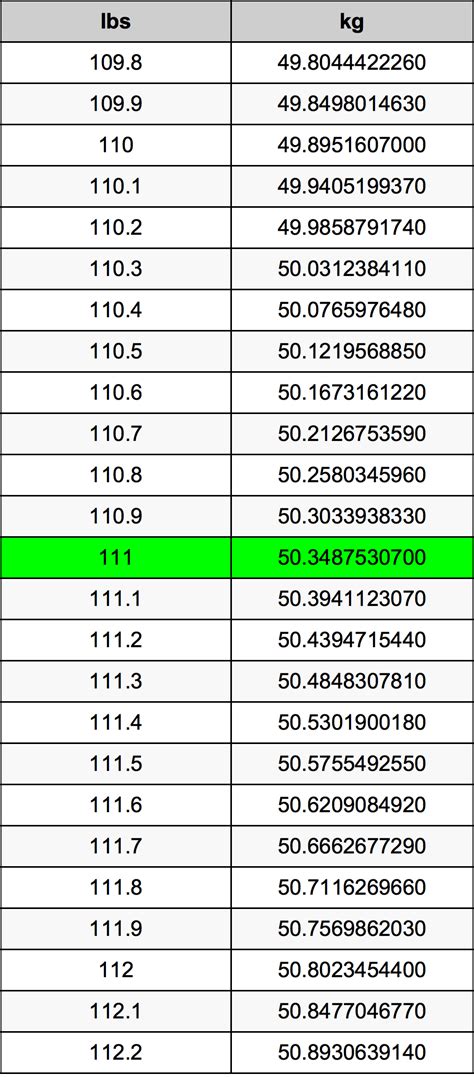To convert 111 pounds to kilograms, we use the conversion factor where 1 pound is equal to 0.453592 kilograms.
So, 111 pounds * 0.453592 kilograms/pound = 50.337 kilograms
Therefore, 111 pounds is approximately equal to 50.337 kilograms.
Here is the calculation in a table format for clarity:
| Pounds | Kilograms |
|---|---|
| 111 | 50.337 |

This conversion is useful for understanding weights in different units, especially when dealing with recipes, body weight, or object masses that are measured in pounds but need to be converted to the metric system for various reasons.
Key Points
- The conversion factor from pounds to kilograms is approximately 0.453592 kilograms per pound.
- 111 pounds is equivalent to 50.337 kilograms when using this conversion factor.
- This conversion is crucial in various applications, including cooking, health, and science, where measurements need to be in the metric system.
- Understanding the conversion between pounds and kilograms enhances the ability to work with different measurement systems effectively.
- For precise calculations, especially in scientific or technical contexts, using the exact conversion factor is recommended.
Understanding the Conversion Process

The process of converting pounds to kilograms involves multiplying the number of pounds by the conversion factor (0.453592 kilograms/pound). This factor is derived from the definition of the pound and kilogram units within the imperial and metric systems, respectively.
Importance of Conversion Accuracy
In many fields, such as medicine, engineering, and international trade, the accuracy of weight measurements is critical. Small discrepancies can lead to significant differences in outcomes, whether it’s the dosage of a medication, the structural integrity of a building, or the pricing of goods.
| Conversion Factor Precision | Application |
|---|---|
| 0.453592 (full precision) | Scientific research, precise engineering |
| 0.4536 (rounded to four decimal places) | General applications, everyday use |
Applications of Weight Conversion

Converting between pounds and kilograms is essential in various sectors, including but not limited to, healthcare for patient weight management, culinary arts for recipe adjustments, and commerce for product labeling and shipping.
In healthcare, accurate weight measurements are vital for calculating medication dosages and monitoring patient progress. In the culinary world, converting recipe ingredients from one system to another ensures that dishes are prepared correctly, maintaining their intended taste and nutritional value.
Cultural and Practical Considerations
The preference for either the imperial or metric system often depends on cultural and historical contexts. In the United States, for instance, pounds are commonly used for body weight, while in most other countries, kilograms are the standard. Understanding and being able to convert between these units facilitates international communication and cooperation.
Why is it important to know how to convert pounds to kilograms?
+Knowing how to convert pounds to kilograms is important because it allows for effective communication and calculation across different systems of measurement, which is crucial in various aspects of life, including health, commerce, and science.
How do I convert 111 pounds to kilograms?
+To convert 111 pounds to kilograms, you multiply 111 by the conversion factor 0.453592. This calculation yields approximately 50.337 kilograms.
What is the significance of using precise conversion factors?
+Using precise conversion factors is significant because it minimizes errors in calculations, especially in applications where small discrepancies can have considerable effects, such as in scientific research, engineering, and medical dosages.



